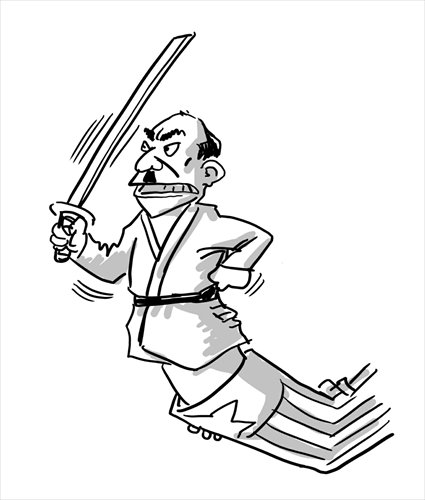Deeper US-Japan alliance leaves Tokyo at risk

Illustration: Liu Rui/GT
In early October, the US and Japan held a Security Consultative Committee meeting, and the presence of the US secretaries of state and defense in Tokyo was interpreted as a meaningful reaffirmation of Washington's commitment to the alliance.
The joint statement issued after the meeting indicated the willingness of both sides to move toward "a more robust alliance and greater shared responsibilities." From a Chinese perspective, however, it is a disturbing move that will have grave consequences for the regional strategic landscape.
The two countries agreed to set a deadline for revising the Guidelines for US-Japan Defense Cooperation by the end of 2014. While previously Washington was the driver for and creator of the guidelines, now Tokyo is very ambitious to take the lead.
The US extended its explicit support for the security reform agenda of the Abe administration, including the establishment of a National Security Council, excising the right of collective self-defense, and other sensitive moves. In addition, the bilateral dialogue on defense acquisition will be strengthened to seek a "combined" approach to pooling and sharing the defense resources.
Given the increasing significance of China's economic and security role in the region, the assertion that the alliance is "the cornerstone of peace and stability in the Asia-Pacific region" is a dubious one. Security plans need to include, not omit, China. As a legacy of the Cold War, a US-Japan alliance that takes China as its overarching adversary will be very risky. A recalibration in security relations among Washington, Beijing and Tokyo is urgently needed.
Employing the US-Japan alliance as the anchor, the US seeks to transform the hub-and-spoke alliance system in the postwar Asia into a networked alliance structure, in the hope of enhancing its military balancing against China and its capabilities to address emergencies on hot spots such as the Korean Peninsula and the South China Sea, in addition to the power to shape the overall regional security structure.
The Obama administration's military strategy lays more emphasis on the complexity of the security environment, putting a premium on the full-spectrum capabilities of joint forces.
The US seeks to establish mobile, agile and adaptable future forces, letting the US play the roles of facilitator, enabler, convener, and guarantor in global security, and highlighting its control of global commons.
Japan, for its part, welcomes the US pivot and seeks to make use of this strategic opportunity to "sail on the borrowed ship."
Through exaggerating security threats, the Abe government tries to force domestic factions to agree with the amendment of the pacifist constitution in order to remove obstacles to the right of collective self-defense.
Japan seeks to go beyond the existing limit on defense spending and alter its three principles of arms exports along with the three-no principles for nuclear capabilities. It also tries to build up the dynamic defense force, seeking equal footing with the US in the alliance.
Indeed, the Abe administration adopts a strategy of dual hedging against the backdrop of the US pivot to the Asia Pacific region and China's rapid ascent. There are many fears in Japan of economic dominance by an increasingly prominent China.
Yet some in Japanese strategic circles believe the US is now in an irreversible relative decline and sooner or later, as part of a deal with China, it will have to sell out Tokyo in the same way as then US president Richard Nixon ignored the concerns of allies in recognizing the PRC.
Thus, they believe, Japan needs to formulate a consensus on national security and enhance its military capabilities so as to be able to defend itself on its own.
Masahiro Matsumura, a professor at Saint Andrew's University in Tokyo, once said that Japanese leaders should understand that in the short term Japan has to depend on US hegemony, while in long term, Japan must lower its dependency on the US and gradually detach its subordination to the US.
However, "defending itself on its own" is not to be a feasible and smart choice, and a deepening US-Japan alliance certainly cannot suffice to safeguard Japan's security interests.
What Tokyo should do is to face up to its own limits, partly associated with Japan's historical amnesia, grasp the nuances of the China-US relationship, and make serious efforts to engage in the cooperative security buildup in the region.
For Japanese Prime Minister Shinzo Abe, it would be better to avoid rhetoric such as "Asia's democratic security diamond."
Instead, new thinking on bettering Tokyo's relations with its neighbors, and, in particular, the avoidance of inflammatory actions and statements on contentious historical issues, would be far more helpful in convincing the world that Japan is a responsible and security-conscious nation.
The author is a research fellow with the Charhar Institute and an adjunct fellow with the Center for International and Strategic Studies, Peking University. opinion@globaltimes.com.cn